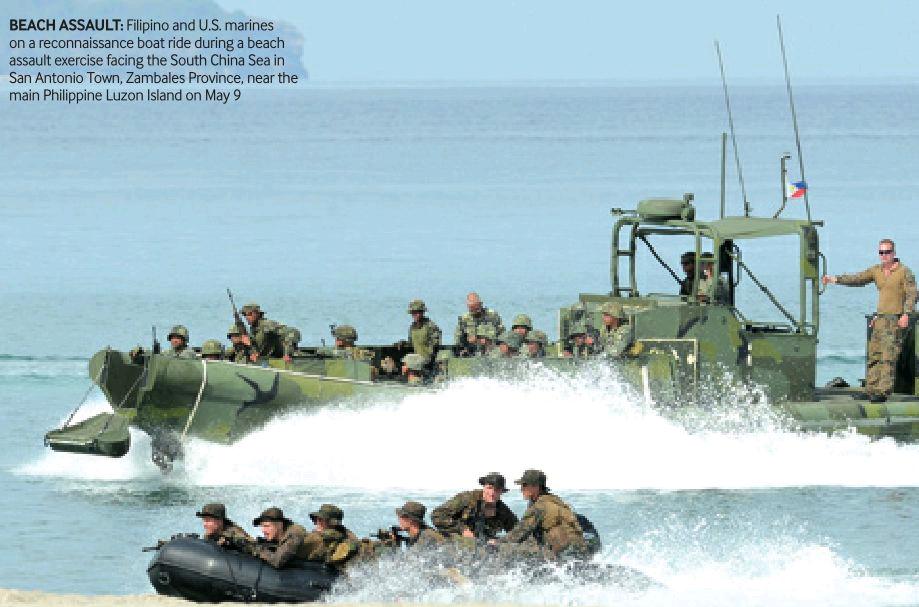The U.S. Shadow
2014-06-05ByYuLintao
By+Yu+Lintao
Even though China exercised restraint in the face of recent provocations by the Philippines and viet Nam in the South China Sea, Beijing did not gain the goodwill of the two Southeast Asian countries in response. Disregarding Chinas opposition, the Philippines charged nine of the 11 Chinese fishermen seized by its police while fishing in waters off Half Moon Shoal, which is under Chinas jurisdiction. And viet Nam has continued to stir up nationalist sentiment against China, aiming to pressure Beijing into discontinuing a Chinese oil companys drilling operations in waters off Chinas Xisha Islands.
However, the current tensions in the South China Sea are neither incidental nor coincidental. Observers have noted that as the United States continues efforts to shift its focus to the AsiaPacific, some regional countries are exploiting the situation to meet their own agenda. Actions taken by the United States to beef up military ties with its regional allies have also taken a toll on regional stability, with irresponsible remarks by U.S. officials regarding the incidents further complicating settlement of the disputes.
Fishing for trouble
On May 6, the Philippine police detained a Chinese fishing boat Qiongqionghai 09063 and the 11 Chinese fishermen on board in waters off Half Moon Shoal of the Nansha Islands, two days after Manila and Washington launched their annual “shoulder to shoulder” military exercise.
The Chinese Foreign Ministry urged the Philippines to release the detained fishermen and their boat as the Half Moon Shoal is traditionally a major Chinese fishing base and China has undisputable sovereign rights over the area. However, the Philippine side ignored Chinas request and charged the fishermen with poaching endangered turtle species.
Luo yuan, a retired major general and Executive vice President of the Beijing-based China Strategic Culture Promotion Association, believed that the move taken by the Philippines is in violation of the UN Convention on the Law of the Sea.
In a recent article published on the Chinese news outlet Global Times, Luo commented that if the fishermen were poaching endangered species around the Half Moon Shoal, the Philippines should have informed China, as the waters are under Chinas jurisdiction. The Philippine side had no right to make the arrests, he added.
Wang Xiaopeng, a sea waters researcher at the Chinese Academy of Social Sciences (CASS), said the Philippines is exploiting its alliance with the United States in the midst of its “pivot-toAsia” strategy.endprint
“The incident happened shortly after U.S. President Barack Obamas latest trip to Manila, so its clear that the Philippines aims to lure the United States into its maritime disputes with China to test whether Washington is committed to strengthening military ties,” Wang said.
During Obamas visit, Washington and Manila signed a 10-year-long Mutual Defense Treaty to increase the U.S. troop presence in the Southeast Asian country. Obama also pledged “ironclad” backing for the Philippines.
With regards to the latest moves by Manila, the GMA News, a major commercial television and radio network in the Philippines, said Obamas visit was an indication that they have acquired the United States protection.
Since Obama left the Philippines, Manila has taken a series of provocative actions in the South China Sea. On May 3, the Philippine air force airdropped supplies to marines stationed on its old transport ship illegally stationed on Chinas Renai Reef. The next day, the “shoulder-to-shoulder” drill was held at the maritime and land areas near the South China Sea. On May 6, after the Philippine police detained the Chinese fishing boat, former Philippine senator Ramos Shahani openly trumpeted the idea of allowing the United States to set up military bases on the Renai Reef and Huangyan Island. Almost at the same time, a senior military officer of the Philippines unexpectedly posed a“defense plan concerning the South China Sea”through the Kyodo News Agency of Japan, advocating more actions to arm the islands and reefs in the disputed waters.
Wang said the series of moves by the Philippines were carefully planned. “As the U.S.-Philippine joint drill goes on, Manilas provocation of Beijing is meant to test whether Washingtons commitments are merely empty talk,” he said.
Wang also mentioned that current social and economic problems within the Philippines have led politicians to shift public attention to the tussle with China over the maritime disputes.
Diplomatic disarray
Chinas Xinhua News Agency reported that from May 3 to 7, about 36 viet Nam vessels, including warships, intruded into waters near a Chinese oil rig in waters off the Xisha Islands to harass the drilling operation and ram Chinese boats.
The reports said vietnamese frogmen were found just five meters away from Chinese ships in an act of intimidation, in addition to illegal placement of numerous broken fishing nets and other large obstacles in the waters that endanger passing ships and vessels. The Chinese ships eventually fought back with water cannons.endprint
As the tension built, the United States ignored the harassment by the vietnamese and instead accused China of “provocation.”
U.S. State Department spokesperson Jen Psaki said in a statement that Chinas deployment of an oil rig in the South China Sea was“provocative.” John Kerry, U.S. Secretary of State on May 12 also described Chinas self-defense maneuvers as “aggressive.”
In response to the U.S. officials remarks, Beijing urged Washington to reflect on its stance on the South China Sea.
“There is indeed a country taking provocative actions in the South China Sea, but this country is not China,” Foreign Ministry spokeswoman Hua Chunying said at a daily press briefing on May 13.“The recent series of irresponsible and factually incorrect comments from the United States have encouraged certain countries dangerous and provocative behavior.”
“We expect the United States to reflect on its acts. If it indeed expects the Pacific Ocean to be pacific, it should consider what role it can play in maintaining regional peace and stability,” Hua added.
Observers claimed that the intervention of outside parties have further complicated the security situation of the South China Sea and even the whole Asia-Pacific. It is neither helpful for the settlement of the disputes nor conducive to the lasting peace and stability of the region.
If the United States continues to incite the governments of some regional countries, peace can hardly be achieved in the South China Sea, Wang with the CASS said.endprint
